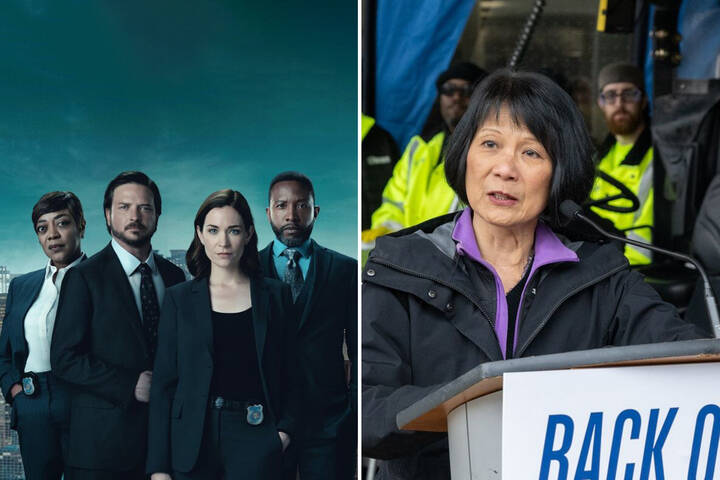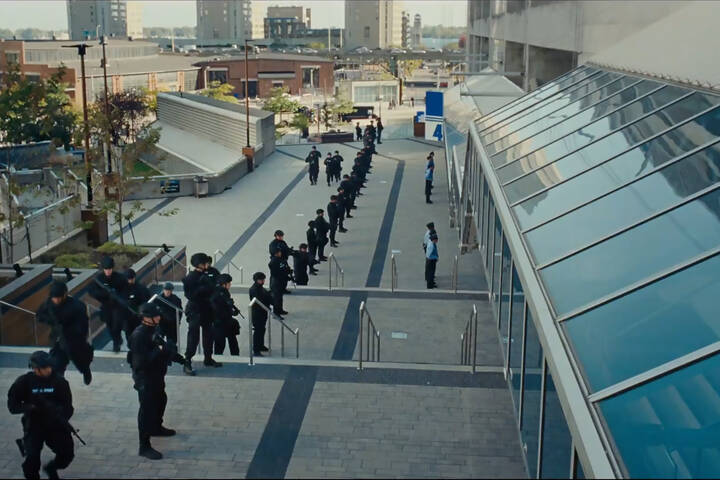
TIFF faces an uncertain future as other festivals snag top films and talent
When Bill Marshall, Dusty Cohl and Henk Van der Kolk started what they dubbed the Festival of Festivals back in 1976, the cinema landscape was completely different to what it is today.
The event that would grow into the Toronto International Film Festival and, as its name would suggest, a showcase for the best of World Cinema.
Movies were primarily drawn from the other major festivals around the world, back when there were no home video options, the internet was a lab experiment, and the dream of being able to stream from the comfort of your couch was the stuff of science fiction.
TIFF would soon grow to be the core fall festival, home to not only discoveries, experimental works and local showcases, but the prime programme for many of the biggest critical and commercial hits of the year.
With a run of dozens of Oscar best picture winners, as well as a slew of other award winning films, Toronto was the undisputed place for the cinema world to gather as Summer turned to Fall.
In recent years other festivals have increased in prominence, poaching many titles that traditionally would have been under Toronto's purview.
There are still hundreds of titles to see at TIFF, with its mix of fest faves and World Premieres, but taking a look at the most buzzed about titles this year and there seems at least at first glance that some of the shine of our local event is being dulled.
TIFF's top competition
Cannes takes place every May and first officially ran in 1946 as a partnership between post-War European filmmakers and Hollywood producers.
Venice, the oldest major film festival in the world that's held in late August, was begun in 1932 by an avowed fascist who had served as one of Benito Mussolini's main political allies.
The Berlinale, held each February, began in 1951, and it is the only public festival whose attendance numbers rival those of TIFF today.
Sundance, founded by Robert Redford in 1978, starts the year off with its January slot.
Telluride, running at same time as Venice, also began in the mid-70's, and New York's late September-situated fest was launched in 1963.
Things can take a turn for the worse
The Montreal World Film festival, founded a year after TIFF, was considered for many years the most prestigious festival in the country.
Many films would premiere in Montreal (David Lynch's Blue Velvet comes to mind) and then the print would take a trip down the 401 to screen in town a few days or weeks later.
Over the decades thanks to poor management, egregious programming decisions and a number of other factors its importance on the global festival calendar diminished to irrelevance.
With increasing pressure from its fellow fall festivals, could the same fate befall an organization of the scope and prominence of TIFF?
What's absent from TIFF's slate this year?
Looking at the Venice slate there are more than a few films that are simply skipping Toronto to play either at Telluride, NYFF, or other festivals.
These include Michael Mann's much anticipated Ferrari starring Adam Driver, David Fincher's return with The Killer, Yorgos Lanthimos's Poor Things featuring Emma Stone, the late William Friedkin's The Caine Mutiny Court-Martial, Pablo Larrain's comedy/horror El Conde, and, above all, Bradley Cooper's much anticipated Maestro.
Other films that TIFF audiences will miss out on include Wes Anderson's latest, the short film The Wonderful Story of Henry Sugar, Timm Kröger's well reviewed The Theory of Everything, Sofia Coppola's Presley drama Priscilla, and Woody Allen’s French language caper Coup de Chance that received a 10 minute standing ovation at its Venice debut and yet is unlikely to ever get a screening even in the Director's hometown.
Telluride snagged All of Us Stangers by Andrew Haigh which is generating plenty of attention for Andrew Scott's lead performance, as has Barry Keoghan turn in Emerald Fennel's Saltburn, and TIFF veteran Jeff Nichols' Bikeriders skipped Toronto in favour of Colorado.
Tehachapi isn't coming either, despite the fact that the director, JR, shared a TIFF People’s Choice award for Faces/Places, a film co-directed with Agnes Varda whose name now festoons the 3rd floor lounge.
New York, meanwhile, grabbed the likes of Foe, a film based on a book by Canadian Iain Reid and directed by Aussie filmaker Garth Davis whose Lion made a big splash here back in 2016.
The Safdie Brothers just had a major retrospective at the Lightbox, yet Bennie’s latest film The Curse isn't been screened for TIFF moviegoers.
Should local audiences be concerned or feel cheated?
Every year certain films choose to play or skip certain festivals, and the TIFF programmers will no doubt simply argue they selected a different slate, pointing to the many World Premieres that they are showcasing that Venice and Telluride missed out on, and dozens that are playing at more than one fest are making their Canadian debut here.
The issue, however, is one of perception as much as about programming, and while the likes of Lee, Dumb Money or Next Goal Wins are going to generate plenty of attention, they don't seem for many observers both here and abroad to rise to the level that the Venice and Telluride slates are able to provide.
The rise of Venice and Telluride
TIFF being on top has made it an easy target for savvy programming teams to garner coveted attention from the world's press, and a few things have unfolded to unsettle TIFF’s prominence.
The first was a battle of words almost a decade ago from TIFF regarding World Premiere status that resulted in many films increasingly choosing to move their premieres to the much more cloistered environment of Telluride.
At the same time, Venice's Alberto Barbera in his second stint as president has assembled a mighty team of programmers that have definitely shifted many of the major premieres of the season to the Lido.
An uncertain future for TIFF
The challenges for TIFF go well beyond not snagging certain buzz-worthy titles. The programming team has seen a major overhaul, with certain veteran voices that were a major part of the rise of the fest and had the connections to snag well sought-after titles no longer part of the team.
Senior executives have recently exited, joining a large number of long-term employees have found the working environment untenable.
Major sponsors like Bell are leaving after decades-long commitments, and a number of international press and film patrons are skipping coming to town in favour of other opportunities.
Will anything change?
Any Toronto hockey fan knows that a lack of world class talent or competitive success does little to abate public demand for attendance.
Tickets for TIFF, despite the hellacious system required to secure, are still selling well. King Street is set to be packed, and the enthusiasm for the titles that are here remains extremely high.
Sure, we're not getting the red carpet of past years, but that's a factor of the WGA/SAG strike as much as which titles were fought for to be selected. As long as people flock to the festival, regardless of what's playing, there's little incentive to make any changes in the short term.
Still, the lack of superpower event films means certain sponsors are likely to step back in even greater numbers, and even fans of the most obscure, experimental film must take into account that the entire festival relies on this careful balance between the new, the local, the discovery, and the major contender films.
It's that later category that of late has slipped more and more out of TIFF's grasp, and it's impossible to know if this is a trend or merely a quirk of this year's selection.
What the future may hold
One can't help think that many of the films premiering at the other festivals were exactly the ones that only a few years ago would be fighting tooth and nail to play for Toronto audiences.
Are the programmers not able to snag these, or are they skipping in favour of often more safe, milquetoast options? Are the political mandates of the festival egregiously affecting what's being selected, as award winning filmmaker Paul Schrader has gone on record about?
Is TIFF becoming less important on the calendar, or are we simply seeing a blip this year thanks to the strike, with things more back to normal in 2024 after an inevitable resolution by then?
Time will tell whether the best of TIFF is behind it, and whether the enthusiasm for such a massive festival will continue in a world where films are literally at your fingertips from the comfort of your couch.
As someone who calls Toronto home in major part because of this 10 day event, I can only hope that those in charge take seriously the challenge these other festivals are presenting.
I hope they redouble efforts to secure these top-level films, be unafraid to program certain titles that may ruffle some feathers allowing audiences rather than moral gatekeepers to decide on a film's qualities, and that this remarkable festival can be sustained for decades to come.
Latest Videos
Latest Videos
Join the conversation Load comments







